
A new system for classifying curly hair types using precise measurements can improve hair care products and cultural inclusion.
 January 2023 in “Theranostics”
January 2023 in “Theranostics” Mechanical force is important for the first contact between skin cells and hair growth in mini-organs.

New methods to classify curly hair types were developed based on shape and strength.
January 2018 in “Journal of Visualized Experiments” PRP injections significantly increased hair count and density with less pain.
20 citations,
January 2013 in “Plastic & Reconstructive Surgery” The new device safely and effectively rejuvenates skin, making it thicker and healthier.
 May 2023 in “Accounts of chemical research”
May 2023 in “Accounts of chemical research” New methods can better classify curly hair types and lead to improved hair care products.
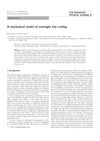 September 2015 in “The European physical journal. E, Soft matter and biological physics/The European physical journal. E, Soft matter”
September 2015 in “The European physical journal. E, Soft matter and biological physics/The European physical journal. E, Soft matter” Longer time setting curls overnight leads to better curl retention.
51 citations,
September 2012 in “Biomacromolecules” Disulfide bonds make keratin in hair stronger and tougher.
16 citations,
November 2018 in “The journal of pain/Journal of pain” 14,15-EET may help reduce poststroke pain by affecting certain brain proteins.
10 citations,
July 2015 in “International Journal of Trichology”  1 citations,
December 2023 in “Scientific reports”
1 citations,
December 2023 in “Scientific reports” 3D microenvironments in microwells improve hair follicle stem cell behavior and hair regeneration.
 1 citations,
May 2022 in “Frontiers in medicine”
1 citations,
May 2022 in “Frontiers in medicine” Metformin helps improve skin regeneration by increasing the growth of skin stem cells.
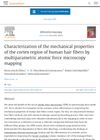 May 2024 in “Ultramicroscopy”
May 2024 in “Ultramicroscopy” Atomic Force Microscopy is a more accurate way to assess hair damage and the effect of cosmetic treatments.
October 2021 in “The journal of investigative dermatology/Journal of investigative dermatology” Desmoglein 3 is important for keeping hair follicle stem cells inactive and maintaining their special properties.
September 2021 in “LAUTECH Journal of Civil and Environmental Studies” The 2% minoxidil cream is stable, spreads well on the skin, and helps with hair growth.
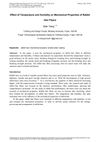 October 2012 in “Advanced Materials Research”
October 2012 in “Advanced Materials Research” Higher temperatures improve rabbit hair strength up to 50°C, but moisture weakens it.
2 citations,
November 2023 in “Biomolecules” WNT signaling is crucial for skin development and healing.
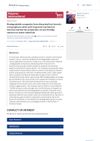 1 citations,
November 2023 in “Polymer International”
1 citations,
November 2023 in “Polymer International” The keratin-graphene oxide composite is stronger, more heat resistant, and better at blocking gases than pure keratin, offering an eco-friendly use for waste hair.
 October 2023 in “Materials chemistry and physics (Print)”
October 2023 in “Materials chemistry and physics (Print)” Adding keratin to a mix of cow hair and plant-based plastic makes it stronger.

Coconut oil helps protect and improve damaged hair.
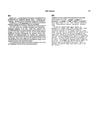 June 1996 in “Journal of Dermatological Science”
June 1996 in “Journal of Dermatological Science” Vitamin D3 applied to mouse skin caused more wrinkles and sagging due to changes in the skin's outer layer.
46 citations,
June 2013 in “Journal of structural biology” High glycine–tyrosine keratin-associated proteins help make hair strong and maintain its shape.
12 citations,
July 2015 in “British journal of dermatology/British journal of dermatology, Supplement” Curly hair breaks due to mechanical damage and environmental factors, not chemical makeup, and needs ongoing care to prevent breakage.
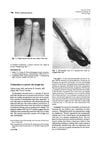 3 citations,
October 1990 in “Journal of the American Academy of Dermatology”
3 citations,
October 1990 in “Journal of the American Academy of Dermatology” Mechanical trauma like towel drying can cause knotted hair even in straight hair.
 November 2011 in “Informa Healthcare eBooks”
November 2011 in “Informa Healthcare eBooks” Environmental, chemical, mechanical, and personal health factors can all damage hair and contribute to hair loss or changes in hair quality.
 286 citations,
April 2009 in “The journal of neuroscience/The Journal of neuroscience”
286 citations,
April 2009 in “The journal of neuroscience/The Journal of neuroscience” TRPA1 is crucial for mechanical sensitivity in skin sensory neurons.
3 citations,
November 2021 in “Journal of biomedical materials research. Part B, Applied biomaterials” AMFIBHA scaffold significantly healed large full-thickness burn wounds in rabbits and restored skin's mechanical properties.
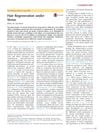 2 citations,
May 2018 in “Journal of Investigative Dermatology”
2 citations,
May 2018 in “Journal of Investigative Dermatology” Mice can regrow hair on wounds due to specific cell interactions and mechanical forces not seen in rats.
1 citations,
July 2006 in “Reviews in gynaecological and perinatal practice” The document concludes that hirsutism in women, often caused by PCOS, requires systematic evaluation and can be treated with medications, mechanical removal, or cosmetic methods, with weight loss also being beneficial.
















